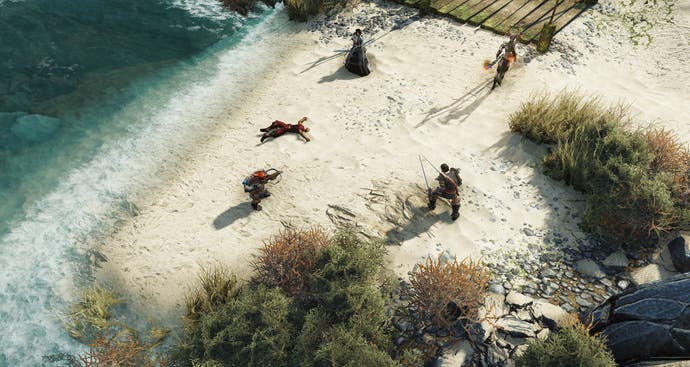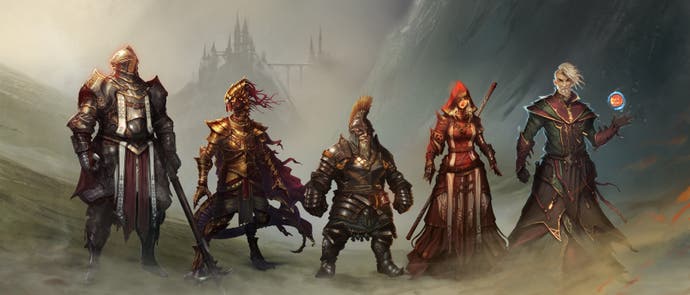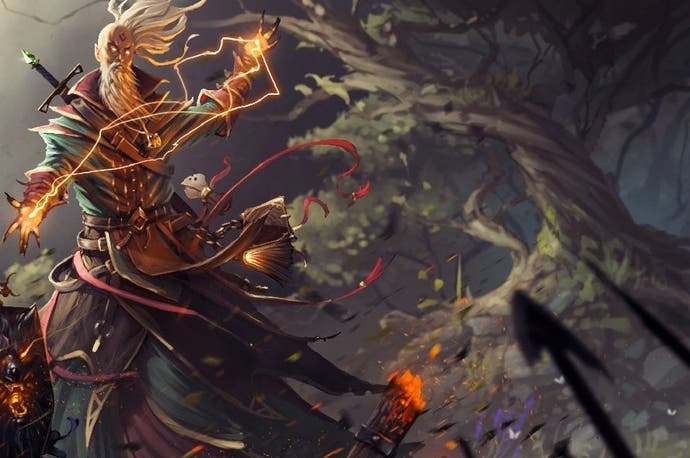How Larian is branching out the modern RPG
Divine divinterview.
Kickstarter and RPGs have gone together like, well, nostalgia and money over the last couple of years. From Wasteland 2 to Pillars of Eternity to Divinity: Original Sin, they've done great business, and resulted in great games. But that was then. It's time for the second wave.
Larian's Sven Vincke is one of the first developers to return for a second try - at least with a new project, as opposed to another revival like Brian Fargo's upcoming Bard's Tale 4. Divinity: Original Sin was a huge success on every front, getting great reviews and selling well enough to justify a huge Enhanced Edition in the coming months that, amongst other things, takes the game to consoles, rewrites some of its rough edges, and puts voice to all of its dialogue. After such success, why go back to the crowdfunding well?
"We have Original Sin 2. It's funded," Vincke states. "There's no doubt about that. Original Sin was a success, and we're putting everything from that into Original Sin 2. We don't need publishers, we don't need investors. But, what defines a great RPG is freedom of choice - and choice means options, and options mean features and features obviously translate into budget. So, what are the options that Kickstarter let us increase? We can increase the number of origin stories. Every one is going to be a lot of work, with a lot of choices to make. We can have more races, each with custom armour models and animations and voice, and since there's no point if characters aren't reacting to that choice, that's a whole lot more writing to be done. Then we have skills. We already have a lot in there, but there's a lot of skill trees people would like to see and we just can't do all of them. Same goes for systems. There's a lot of systems we could add... If people give us the room to do all this extra stuff, then we'll happily do all that, because we like our RPGs! We're also offering people the game at a lower price, and with Kickstarter, if you back it, you know that your money is going into the game rather than just into someone's coffers. We're not doing this to grab money. It's all going into the game."

Despite this, Larian wasn't always going to return to Kickstarter. Last year, Vincke's opinion was that while it had worked well, and the company wanted to harness its community again in future games, Kickstarter specifically was a one-time thing. "Yeah. For a long time, it was a much debated issue. Originally I wasn't a big fan of the idea, but then I had a big argument with Brian Fargo, of all people, who convinced me. My argument was that Kickstarter is there to start something, not to continue something. He said that wasn't true. He pointed out that big Kickstarters are necessary in the current ecosystem, and he's right." As just one example of that, "When we do an update on Kickstarter, people see that immediately and then they get involved." Also, "A large project on Kickstarter is not necessarily a negative for the others on there."
It's not going to be an ongoing Kickstarter though, as some companies run. "I think that the Kickstarter will have its own specific rewards, and after that we'll go to Early Access. Part of the success of Original Sin was the early feedback and how systems like combat and crafting worked - that wasn't the case originally! There was a shitload of feedback on skills and traits and balance. At some points we were changing things every week and seeing who was right, and we gained a much better system out of that. The amount of little things where we saw people weren't getting something... that cost a lot of effort, but we got so much positive feedback. It really motivated the developers seeing that the players were into it, and knowing we had to do it for them."
Enhanced Edition is a free update for Divinity: Original Sin owners, coming later this year. Along with the new features, much of it has been about improving the flow and narrative of the game and letting Larian see where it went wrong. "We had two Western Gates in the first town," Vincke points out, sighing. "So when we said to players, 'go out of the Western Gate...'"
Suffice to say, the results could be pretty painful for a new player. The changes here aren't about dumbing down the game though, with Larian still not providing quest objective markers and the like, but it does promise to be a lot easier to get into. "We have a character called Ahu, who is now present more to tell you the things you need to know - the cat shapeshifter. In the past, he'd just have one word or one phrase. Now he gets a whole paragraph to explain. At other times, it'll be something like moving a door a little so that you see it... just matters of lack of time, not enough iteration, not enough QA people to see things. We're fixing those. But we're not handholding, and we can't handhold. We don't have quests, we just have things you can do, and there's so many ways you can do them that we just can't put them into a quest log like other games do. You can smash a door, lockpick a door, find the key for the door... if you start writing out all these permutations then it's just impossible. We'll never be able to handhold like that. But also, it's not something we believe in doing. I hate it like hell, having my exploration just taken away."

But back to Kickstarter. Easily the biggest leap from the earlier Divinity games to Original Sin was its focus on these kind of systems, which was only possible with the crowdfunding model. "We're independent now. That's the big difference. With a publisher, our games had to be written to convince the marketing people, and then once the contract was signed, it was then trade shows and press and no time. Here, there was real focus on what we were doing. We knew we'd be making Original Sin 2 when we made Original Sin, so the systems had to be very solid. You're right, it's a complete flip for us, but that's what digital distribution made possible."
Had the Kickstarter not panned out though, would Larian still be around? Vincke errs on the side of optimism, but only just. "It would have been very close, but we've been through very hard times before. We'd be in the shit situation we were in before, but we'd still be around. At the end, it was touch and go. I had to drive to the last banker in Belgium who would give us money - literally the last banker. We had investors screaming and distributors screaming... you should see my mailbox. The yelling that was being done at me! But I refused to release the game, because I knew that if we didn't release it in a state where it sold, it was all going to be for nothing. Harsh words. So many harsh words. But, later, they changed into nice words. Shows you their value!"
"Now though, we're in a good spot to make Original Sin 2. We've increased in size and resources, and we're trying to make our Baldur's Gate 2 - not literally Baldur's Gate 2 of course, but building on the same engine, giving you lots of skills from the start, building on top of it, working on the UI, trying out new ideas and new stuff on top of our very solid core. And of course, we have an extra advantage that Bioware didn't have when it made Baldur's Gate 2 - we have the community to help us out."
"It's definitely our ambition to jump higher. We want to make RPGs that people will still be talking about in 10-15 years, because it was so different and there's so much still to do with these system based games that people haven't explored since the 90s, since the likes of Diablo came along. It's an old discussion, but if you imagine game development as one big tree, you look back to the 90s and so many branches were being explored. But then you go to 2000, and there's only one branch left and all the others were just left alone. Now, with digital, with Kickstarter, we can finally start to see the others again - and much cooler things than we thought we had."

